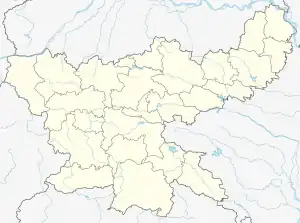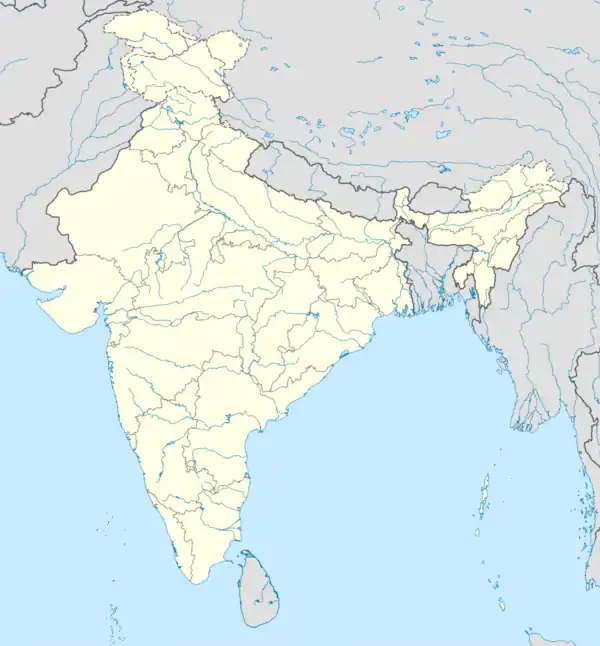Haludbani | |
|---|---|
Census Town | |
 Haludbani Location in Jharkhand, India  Haludbani Haludbani (India) | |
| Coordinates: 22°45′10″N 86°12′47″E / 22.7528°N 86.2131°E | |
| Country | |
| State | Jharkhand |
| District | Purbi Singhbhum |
| Area | |
| • Total | 3.92 km2 (1.51 sq mi) |
| Population (2011) | |
| • Total | 23,260 |
| • Density | 5,900/km2 (15,000/sq mi) |
| Languages* | |
| • Official | Hindi, Urdu |
| Time zone | UTC+5:30 (IST) |
| PIN | 831002 |
| Telephone/STD code | 0657 |
| Vehicle registration | JH 05 |
| Literacy | 84.68% |
| Lok Sabha constituency | Jamshedpur |
| Vidhan Sabha constituency | Potka |
| Website | jamshedpur |
Haludbani is a census town in the Golmuri-cum-Jugsalai CD block in the Dhalbhum subdivision of the Purbi Singhbhum district in the Indian state of Jharkhand.
Geography
Location
Haludbani is located at 22°45′10″N 86°12′47″E / 22.7528°N 86.2131°E.
Jamshedpur Urban Agglomeration
With its recognition as an industrial town as early as the 1911 census, Jamshedpur was set on the road of steady population growth, as large number of emigrants flocked in for work opportunities. While in the earlier decades the central nucleus grew, in the later decades towns around Jamshedpur grew rapidly. In 2011, Jamshedpur Urban Agglomeration included 13 urban centres, with a total population of 1.3 million people. However, in more recent years, Jamshedpur UA “has lacked the growth and development observed around other similar industrial towns in western and southern India.”[1]
Note: The map alongside presents the Jamshedpur Urban Agglomeration. All places marked in the map are linked in the larger full screen map.
Demographics
According to the 2011 Census of India, Haludbani had a total population of 23,360, of which 12,949 (51%) were males and 12,411 (49%) were females. Population in the age range 0-6 years was 3,003. The total number of literate persons in Haludbani was 18,931 (84.68% of the population over 6 years). [2]
(*For language details see Golmuri-cum-Jugsalai block#Language and religion)
Jamshedpur Urban Agglomeration includes: Jamshedpur (Industrial Town), Jamshedpur (NAC), Tata Nagar Railway Colony (OG), Mango (NAC), Jugsalai (M), Bagbera (CT), Chhota Gobindpur (CT), Haludbani (CT), Sarjamda (CT), Gadhra (CT), Ghorabandha (CT), Purihasa (CT), Adityapur (M Corp.), Chota Gamahria (CT) and Kapali (CT).[3]
At the 2001 India census,[4] Haludbani had a population of 19,933 (51% male, 49% female). Haludbani had an average literacy rate of 71%, higher than the national average of 59.5%. Male literacy was 78% and female literacy was 62%. 12% of the population were under 6 years of age.
Infrastructure
According to the District Census Handbook 2011, Purbi Singhbhum, Haludbani covered an area of 3.92 km2 (1.51 sq mi). It has an annual rainfall of 1,030.2 mm (40.56 in). Among the civic amenities, it had 12 km (7.5 mi) of roads with open drains, the protected water supply involved hand pump, tube well/ borewell, overhead tank. It had 4,787 domestic electric connections, 10 road lighting points. Among the medical facilities, it had 5 hospitals, 5 dispensaries, 5 health centres, 7 family welfare centres, 12 maternity and child welfare centres, 12 maternity homes, 12 nursing homes, 6 veterinary hospitals, 2 medicine shops. Among the educational facilities it had 3 primary schools, 2 middle schools, the nearest secondary and senior secondary school at Sarjamda, 3 km (1.9 mi) away, the nearest general degree college at Jamshedpur, 15 km (9.3 mi) away. It had 1 non-formal education centre (Sarva Shiksha Abhiyan). It produced sattu. It had the branch offices of 1 nationalised bank, 1 cooperative bank, 1 agricultural credit society.[5]
References
- ↑ "Growth of Industrial Cities in India: A Case Study of Jamshedpur" (PDF). Amaresh Dubey. The Third Conference: GIS-based Global History from Asian Perspectives, 5 June 2015. Retrieved 25 December 2021.
- ↑ "District Census Handbook, Purbi Singhbhum, Series 21, Part XII B" (PDF). Location code: 363454, Pages 26-27: District primary census abstract, 2011 census. Directorate of Census Operations Jharkhand. Retrieved 15 December 2021.
- ↑ "Constituents of Urban Agglomerations Having Population 1 Lakh & above" (PDF). Provisional Population Totals, Census of India 2011. Retrieved 15 December 2021.
- ↑ "Census of India 2001: Data from the 2001 Census, including cities, villages and towns (Provisional)". Census Commission of India. Archived from the original on 16 June 2004. Retrieved 1 November 2008.
- ↑ "District Census Handbook, Purbi Singhbhum, Series 21, Part XII A" (PDF). Pages 863-871. Directorate of Census Operations Jharkhand. Retrieved 14 December 2021.